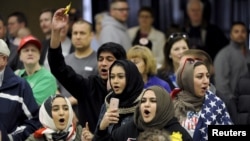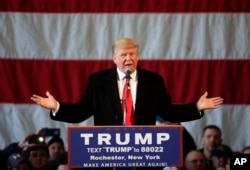Religious leaders representing a mosaic of faiths gathered on Thursday at a news conference to urge the U.S. Republican and Democratic parties to add into their party platforms a rejection of anti-Muslim bigotry.
During the conference, hosted by the Islamic Society of North America at the National Press Club in Washington, leaders said a formal letter was sent to both parties asking them to stand against all discrimination and anti-Muslim bigotry by adding “explicit” language to their platforms in the upcoming nominating conventions.
The initiative is part of Shoulder-to-Shoulder, an interfaith coalition of more than 32 faith groups that speaks out against hate.
“As Americans, we are deeply concerned by the prominence of anti-Muslim rhetoric and bigotry on the campaign trail. Such rhetoric does real harm to Muslim communities and other religious minorities throughout our nation,” said Islamic Society of North America (ISNA) President Azhar Azeez.
This election season has been filled with controversial comments directed at Muslims. Republican front-runner Donald Trump has called for a ban on Muslims entering the United States. Trump also said he would consider shutting down some U.S. mosques.
“Don’t talk this way. This is not America ... This is not human. This is not the recognition that we are one family here,” said former archbishop of Washington Cardinal Theodore McCarrick.
McCarrick added that the attack on Muslim-Americans is a “stupidity” and “the worst politics that they can do.”
Campaign trail rhetoric
Others have personally experienced the anti-Muslim rhetoric shared on campaign trails.
Fatima Salman, who calls herself a “proud” Muslim resident of Michigan in the north-central U.S., said she was always comforted by the fact that her state was “well-integrated,” with people standing “side-by-side.”
Salman is a social worker in a Detroit suburb, helping local residents in some of the poorest neighborhoods build leadership capacity “because I firmly believe in the potential of people to create change.”
She said all it took was one city council meeting she recently attended to shatter these feelings of peace. The town where she lives, West Bloomfield, was going to vote on becoming a designated “welcoming city.”
“I walked into a nightmare that day — 125 people in opposition of welcoming immigrants into our city met me with cold icy stares of hate and anger towards me and my Muslim community," she said.
People got up to the microphone, she added, using the same hateful words they had heard on the presidential campaign trail and mainstream media. The town voted to maintain the city as a welcoming designation. Salman left the meeting shaken.
“I had two police officers tell me I needed to walk to my car with an escort that day,” she added.
Hatred of that level, she added, is usually driven by fear. She said people going after the highest office in the nation must be held accountable for stoking such feelings in the American people.
“As an American and as a Muslim," Salman said, "I will stand against hate that targets Muslims, hate that targets blacks, hate that targets Mexicans, Jews or women ... Love and goodness win."
Faith leaders also reinforced their stand against terrorism.
Terrorists are a representation of barbaric criminals around the world, said Azeez, adding that ISNA condemns all acts of violence and extremism.
“Muslims around the world do not recognize them or their ideology as a religion authority or a representation of their religion,” Azeez said.





